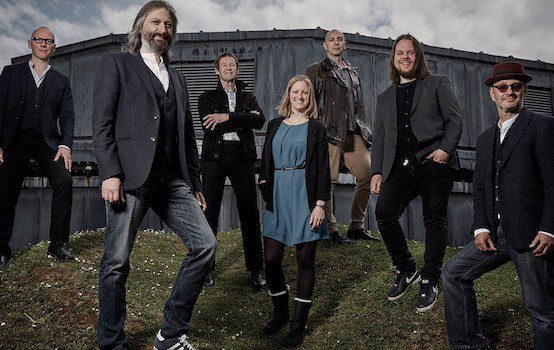An Ode to Progressive Rock

There are few joys in this insane world greater than the pleasure of really artful music, whatever the genre, whatever the market. And of all of the rock bands in the world, the best might very well be England’s Big Big Train (BBT). Well known in the U.K. and Europe, they remain relatively unknown in North America, to our shame. To my mind, the only band that rivals BBT is Tennessee’s Glass Hammer.
As a band and a project, BBT has been around since the early 1990s. Like most living things, it has aged considerably (though quite gracefully) over the past two decades. Guided by its brilliant founding members Greg Spawton and Andy Poole, BBT is now made up of eight full-time members, including one from Sweden and one from the U.S.
Its most famous member is Dave Gregory, formerly the lead guitarist for XTC. Like every member of the band, Gregory is an extraordinary musician pursuing a high art. He is also, I’m happy to note, a true gentleman and, like everyone in the band, a perfectionist. From the beginning of its existence, BBT has honed its complex song structures, riveting melodies, and gorgeous historical, poetic, and mythic lyrics. Almost all of the band’s songs celebrate excellence, innovation, and struggle. Typical themes include World War I and II ace fighters, beekeepers, medieval saints, architects, and survivors of trauma. Lyrically, the band is levels above almost anything being written in popular culture today, and, in the rock-pop world, certainly well beyond Elvis, Madonna, and Lady Gaga.
BBT resides in a sub-genre of rock music known popularly as progressive rock, art rock, or more affectionately “prog.” Prog began as an attempt in the mid-1960s to present rock music as an art form rather than an emotional reaction. American lovers of prog generally date its advent to “Pet Sounds” by the Beach Boys, while the British usually turn to “Sgt. Pepper’s” as the beginning. One of the most important rules about prog is that there are generally no rules. Traditionally, progressive rock incorporates odd, African-American jazz-like tempos and time-signatures with classical European tonal and compositional structures.
For a time, between about 1970 and 1976, progressive rock—led by such bands as ELP, Genesis, and Yes—sold millions of records. But the genre faded in the late 1970s, outcompeted by the less complicated (many would say less talented) punk rock movement. Where progressive rock succeeded during this period, it was usually by incorporating elements of hard rock and metal, such as Canada’s Rush, becoming a part of the experimental New Wave and post-New Wave scene, such as Peter Gabriel did, or, lasting just a bit longer, by embracing Cold War existentialism, as did Pink Floyd.
By 1980, though, all but the most diehard fans of straightforward prog—if such a thing could exist or ever did exist—considered the genre to be pretentious, overly complicated, and bloated. Even books that attempt to cover the genre sympathetically, such as Ed Macan’s Rocking the Classics and Dave Weigel’s The Show That Never Ends, are written in the past tense. When most commentators speak of prog, they do so in mocking tones, remembering Yes’s Rick Wakeman wearing gaudy wizard cloaks.
Beginning in the early 1990s, however, a whole new group of progressive rock artists emerged, especially as the internet began to decentralize the music market and connect various parts of the globe, one to another. Between 1994 and 2000, progressive rock once again gained a substantial following in Europe, the Middle East, India, and the Americas.
This movement, known as “third-wave prog,” has yet to subside. In America, Neal Morse, Glass Hammer, and Dream Theater dominate. In the U.K., Steven Wilson, BBT, and Marillion hold prominent positions. (To be sure, the heart of the third-wave resides in England, centered around editor and kingmaker Jerry Ewing and his geekish and stylish Prog magazine.)
For TAC readers, it’s worth noting that a whole host of serious American conservative and libertarian writers—ranging from Steve Hayward to Tom Woods to S.T. Karnick to Jason Sorens to Steve Horwitz to Sarah Skwire to Aeon Skoble to Carl Olson to Bruce Frohnen—share a deep and abiding affection for prog.
Additionally, progressive music has typically embraced intelligent topics, offering cultural and political criticisms that take anywhere from six to (*gasp*) 78 minutes. The average prog song is three to four times the length of the average pop song. Many prog songs remain strictly instrumental in their opening five to six minutes, with the vocalist finally entering long after the average pop song would have ended. And as in jazz, progressive musicians often play extended passages or solos for impressive amounts of time, emphasizing complexity as well as spontaneity.
This brings us back to that English wonder of wonders, BBT. Though Spawton and company had limited success in their first decade, it was not until 2009 that the band’s current form began to take shape. That year, Spawton recruited and introduced three key elements to their future success: the extraordinary American drummer Nick D’Virgilio (younger brother of Mike D’Virgilio of theamericanculture.org); the minstrel English vocalist, flautist, and composer David Longdon; and guitarist gentleman Dave Gregory. The album that BBT released that year, The Underfall Yard, is every bit as good and meaningful as Brubeck’s Time Out, Simon and Garfunkel’s Bookends, Davis’s Kind of Blue, and U2’s War. While any listener would expect the traditional rock instruments of guitar, bass, drums, and keyboards to be present, few would expect the incorporation of a full English brass band, woodwinds, and strings. The themes of The Underfall Yard revolve around the mysteries of Venus, abandoned industrial areas as archeological wonders, entrepreneurial visionaries, Dante-esque architects, and electrical storms off the coast of England.

None of this ever screams—or even whispers—pretense. Through the extraordinary talents of BBT, it all comes across as a perfect and necessary whole, as though the members of the band have found something that had always existed in the created order but had yet to be seen since the fall of Eden. Once seen (or heard), it can never be unseen, nor should it be. By the time the listener reaches the end of The Underfall Yard, he cares immensely about that which has been lost and should never have been forgotten:
These are old places stood in the way,
Grass grown hills and stone.
Parting the land
With the mark of man,
The permanent way.
Using available light,
He could still see far.
Far have we traveled from the pop ejaculations of “hey, baby, baby.” Spawton and Longdon reach into the realms of Chesterton, Eliot, and Betjeman.
Indeed, Spawton’s lyrics, as quoted above, might have been written, at least in their intent if not in their wording, by the greatest of 18th-century thinkers, Edmund Burke. We see the past because of the sacrifice of our ancestors. We see the present as a means to honor, through piety, those who struggled for us, whether they knew us or not. And we see the future, however dimly, only by the available light of tradition, reason, and nature. Could this not be Burke’s mysterious incorporation of the human race: the dead, the living, and the yet to be born comprising one profound community, transcending the limitations of time and place?
Since 2009, BBT has grown vigorously, adding a full-time keyboardist, Danny Manners, another lead guitarist, Rikard Sjöblom, and a violinist, Rachel Hall. And since the release of The Underfall Yard, they’ve just kept getting better and better with one masterpiece after another: Far Skies Deep Time in 2010, English Electric Full Power in 2013, and Folklore in 2016, in addition to an EP and two live albums.
I believe 2017, however, has truly been the year of BBT. This year alone, the band has released two full albums, Grimspound and The Second Brightest Star, a free 34-minute song “London Song,” and on December 1 a Christmas EP.
There exists not a single false step in any of this. And, despite a mass of releases, quantity has never overwhelmed quality. BBT brims with ideas, especially as Spawton and Longdon play off each other, forming a sort of prog Lennon/McCartney for the 21st century. This is a band at the top of its game, bursting with joy over expressing itself and its art.
Let me note just two additional things.
First, as noted above, there’s a Stoic perfectionist streak in most progressive rock, but none more so than in BBT. When the band releases something, Spawton makes sure every single aspect of it is right, from the music to the lyrics to the packaging.
Second, and equally important, the band members do not see themselves as aloof geniuses, tapping into the esoteric music of the spheres. For BBT, the art is real, but so is the audience. They excel at creating and leavening community, not only among themselves, but for and among the rest of us as well.
As a part of the northern tradition of the Beowulf poet, King Alfred, the eddas, and the sagas, the band sings on one of their 2017 albums:
Here, with book in hand
Follow the hedgerow
To the meadowland
Here with science and art
And beauty and music
And friendship and love
You will find us
The best of what we are
Poets and painters
And writers and dreamers
If you thought rock was an artless and juvenile spewing of emotion, think again.
Pick up any album by BBT and be dazzled, not just by the artistry of the music, but by the invitation to be a part of the art and to become immersed fully into something that is unapologetically true, good, and beautiful.
Cynics need not apply.
Bradley J. Birzer is the president of the American Ideas Institute, which publishes TAC. He holds the Russell Amos Kirk Chair in History at Hillsdale College and is the author, most recently, of Russell Kirk: American Conservative.
Comments